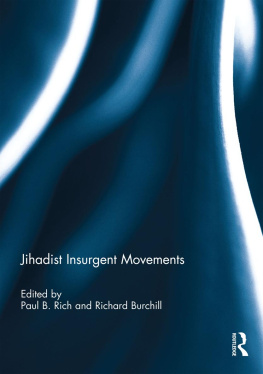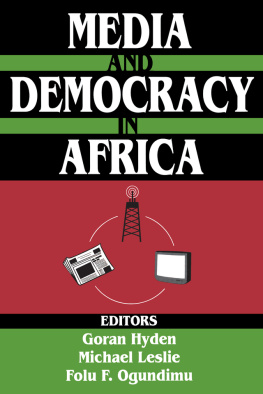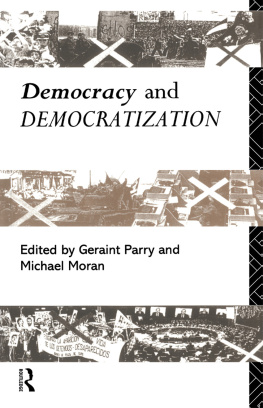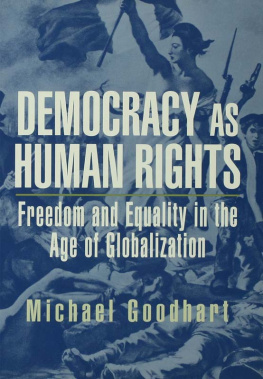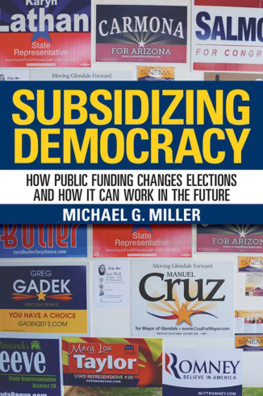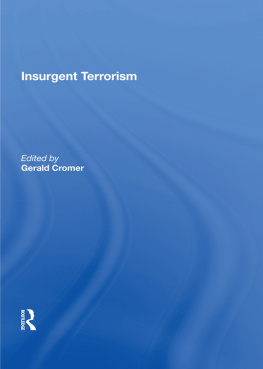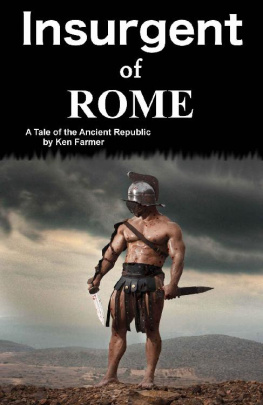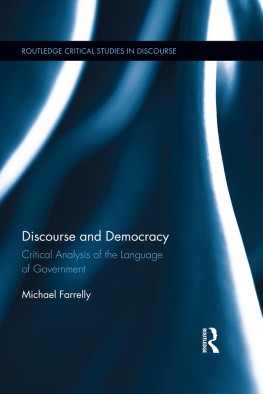Michael J. Lansing is associate professor of history and department chair at Augsburg College in Minneapolis.
The University of Chicago Press, Chicago 60637
The University of Chicago Press, Ltd., London
2015 by Michael J. Lansing
All rights reserved. Published 2015.
Printed in the United States of America
24 23 22 21 20 19 18 17 16 15 1 2 3 4 5
ISBN -13: 978-0-226-28350-0 (cloth)
ISBN -13: 978-0-226-28364-7 (e-book)
DOI : 10.7208/chicago/9780226283647.001.0001
Library of Congress Cataloging-in-Publication Data
Lansing, Michael, author.
Insurgent democracy : the Nonpartisan League in North American politics / Michael J. Lansing.
pages ; cm
Includes bibliographical references and index.
ISBN 978-0-226-28350-0 (cloth : alk. paper) ISBN 978-0-226-28364-7 (e-book) 1. National Nonpartisan LeagueHistory. 2. InsurgencyUnited StatesHistory20th century. 3. Social movementsUnited StatesHistory20th century. 4. FarmersPolitical activityUnited StatesHistory20th century. I. Title.
HD 1485. N 4 L 36 2015
324.2732'7dc23
2014049399
This paper meets the requirements of ANSI / NISO Z 39.481992 (Permanence of Paper).
We need fuller and richer histories of American democracy.
MERLE CURTI , The Democratic Theme in American Historical Literature (1952)
This book means to make you think differently about politics. I wrote it because we live in a time when lobbyists wield inordinate power, officeholders seem distant and corrupt, corporations command votes, bureaucrats ignore lived realities, and citizens remain firmly cynical. Pressing problemsincluding climate change, poverty, mass incarceration, endless war, and discriminationpervade our lives. Our political system seems poorly equipped to do much about them.
We are not the first to face a failed political machinery. In the early twentieth century, farmer discontent in North Dakota grew despite rising prices for wheat. The brutal northern plains environment made eking a living out of the land difficult. Credit ran short. Local banks gouged farmers with exorbitant interest rates on mortgages. Minneapolis-based milling companies controlled commodity prices and railroad shipping rates. They also exerted undue political influence in Bismarck, the state capital.
In 1915, agrarians responded to their plight by creating the starkest challenge to party politics in twentieth-century America. Their movementthe Nonpartisan League (NPL)deployed novel tactics that challenged existing institutions. In an effort to empower citizens, the League drove a brief but powerful electoral insurgency. At its peak, almost 250,000 paying members lived in thirteen states and two Canadian provinces. As a result, the NPL dramatically shaped North American politics in the late 1910s and early 1920s.
Despite the significance of the Nonpartisan League, most today know little about its rise and fall. The few who do remember it as a radical, if doomed, recapitulation of earlier forms of producer politics limited to North Dakota and Minnesota. But viewing the NPL as an outdated, transitory, and local agrarian reaction to specific economic relationships misreads the movements history. It also obscures the persistent potential of the Leagues perspective and tactics.
In fact, the NPL used the then new tools of direct democracy to insist on a moral economy premised on accumulation without concentration. It grew out of cooperative movements and insisted that government establish state-run competition in various economic sectors. It pushed for publicly owned enterprises to compete with private corporations and bring equity to the marketplace. Convinced that markets were the beating heart of the republican experiment, NPL members nonetheless insisted on state-sponsored market fairness. In their minds, the health of the nations political democracy depended entirely on what Leaguers often referred to as economic democracyan equal chance to succeed in a market, a chance that drew from interdependence to foster self-sufficiency.
These commitments seem strange to us today. Small-property holders anxious to use government to create a more equitable form of capitalism cannot be easily categorized in contemporary political terms. They do not fit on the standard political spectrum. Their movement to protect private property from corporate inroads defies easy definition. Yet the League embodied an older, alternative political economy, even as it embraced modern society. It reminded Americans that corporate capitalism was not the only way forward. Most important, it showed that the health of our democracy depended greatly on the specific economic relations we share. In a time when talking heads typically ignore moral economy in their economic analysis, the NPLs perspective deserves our attention.
A nonpartisan stance proved to be the Leagues most original tactic. Sidestepping deep-rooted political parties allowed the NPL to offer those without influence a chance to shape their society. As a candidate-endorsing political organization, the Nonpartisan League took advantage of the newly created direct primary to bypass entrenched politicians. They simply backed anyone who supported the Leagues program, regardless of party.
This bold denunciation of partiesan assumed cornerstone of modern politicsraised the ire of politicians everywhere. It proved to be one of the most important developments in an era of innovative democratic reform. Firmly committed to their affiliations, officeholders envisioned the NPL as a powerful threat. Nonpartisanship offered a way for citizens to directly fashion governance. Replacing the mediating force of a political party with a self-organized polity, these farmers invented an effective alternative to politics as usual. The rejection of parties appealed to farmers in Canada as well. Inroads in Saskatchewan and Alberta showed that the NPLs methods and ideology had a transnational reach.
Home front paranoia during World War I created an opportunity for opponents to strike back. Yet the NPL survived. In many places, it was stronger than ever. By 1920, observers speculated that it would soon transform the national political landscape. Envisioning government not as big or small but instead as the means to express the peoples will, the League sought to restore equity to an unfair economy. The successful establishment of a state-owned bank, flour mill, and grain elevator in North Dakota suggested the changes to come.
But internal dissent caused fissures. Rival organizations and political opponents challenged or co-opted the NPL and its platform. Agricultural depression further weakened the League. In 1923, its national office closed. In the United States, postwar liberals laid claim to the Leagues legacy, even as they buried the NPLs ideology and tactics with elite-managed bureaucracies. In Canada, NPL-inflected thinking lived on in the Cooperative Commonwealth Federation.
At the very moment most American intellectuals gave up on a central role for the people in politicsruing what journalist Walter Lippmann, in 1922, famously dubbed the manufacture of consentthe League showed the ongoing potency of carefully organized and platform-focused citizen politics. It offered a model (however imperfect) for citizen engagement and organizing through its application of cooperative principles to political life.



